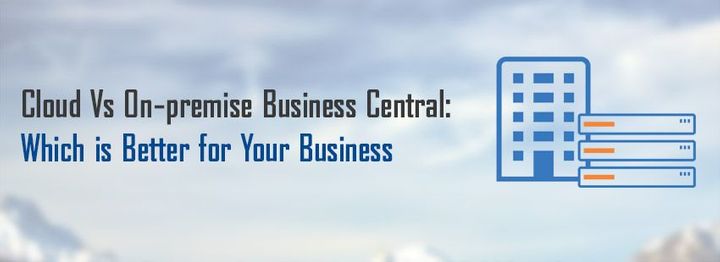Business Central is an ‘all-in-one business solution’ that helps in streamlining business processes by connecting finances, operations, sales, and customer service. Business Central enables organizations to improve customer relations while boosting efficiency. Business Central offers a number of choices such as Cloud, On-premise & Hybrid when it comes to deployment to cater to diversified requirements of the industry.
Business Central in the Cloud:- In this deployment option, Business Central is hosted on Azure, Microsoft’s web services platform with in-built services are managed from a network of managed data centers located across the globe. The data can be accessed through internet-connected devices.
Business Central On-premise:- In this, Business Central is deployed in the private cloud or at your own physical servers. An IT infrastructure is required to host and manage the solution locally.
Factors To Consider While Selecting Between On-premise & Cloud Deployment
Cost:- One of the biggest differences between the two models is cost. With Microsoft Azure, you need to pay on a monthly or annual basis. This deployment model is perfect for those organizations that do not have their own IT infrastructure. If you want to host on-premise and you don’t have IT infrastructure in place then you will require servers, storage, air-conditioning, power, maintenance, and administration. This will, in turn, proves costly. However, on-premises gives you more freedom and control over data. The organizations which have their own IT infrastructure available should opt for On-premise as they can buy perpetual licenses or through a subscription model.
Security:- There are certain industries which are compliant to store their data locally. Most of these organizations are concerned about the security & confidentiality of cloud systems. Though cloud technology uses many sophisticated security methods including encryption & firewalls to protect data, yet the threats of hacking and confidentiality breaching are not completely eliminated. In such a case, On-premise Business Central will be a better option as your business is responsible for the security of your on-premises server. In the case of the cloud, you need to trust the security measures of Microsoft Azure.
Maintenance:- In cloud deployment, you don’t have to worry about your systems as maintenance is included within your monthly cost to the vendor. On-premise deployment requires your IT team & Experts for server maintenance.
Scalability:- With cloud deployment, you have access to all the latest technologies and updates. Furthermore, cloud is scalable as you need to pay only for the space you require. You can also upgrade the space as per your business needs. With On-premise deployment, you are responsible for updating systems.
Customization:- In on-premise deployment, you can customize the CRM extensively as required by your business process. So, it is best suited for enterprises with higher budgets and the desire to customize system operations. In the case of cloud, customization is limited.
Implementation:- As customization is less, cloud deployment requires less time in implementation. However, in on-premise, organizations have more control over implementation and customization, hence requires more time to implementation.
Uptime:- One of the biggest concerns of organizations is server uptime. Most organizations think that their on-premises data center can provide greater overall uptime. The 100% uptime is myth and organizations need to settle on 99.x% with a different number of 9’s after it depending on the cost associated with that specific uptime. Microsoft Azure comes with a 99.95% SLA guarantee which is much higher as compared to most on-premises data centers can hope to offer.
So, you should consider the above mention factors while selecting the deployment models. Though cloud-based deployment has certain limitations related to customization and potential security, yet it is highly appreciated among SMBs. On-premise with advantages like customization and control is a good option for organizations with more budget.








